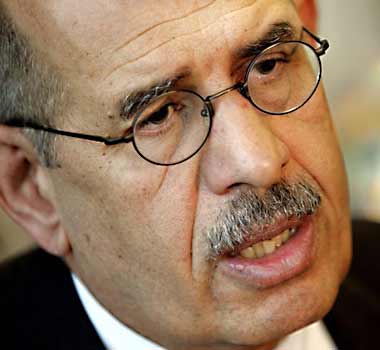ElBaradei wins Nobel peace prize

Your support helps us to tell the story
From reproductive rights to climate change to Big Tech, The Independent is on the ground when the story is developing. Whether it's investigating the financials of Elon Musk's pro-Trump PAC or producing our latest documentary, 'The A Word', which shines a light on the American women fighting for reproductive rights, we know how important it is to parse out the facts from the messaging.
At such a critical moment in US history, we need reporters on the ground. Your donation allows us to keep sending journalists to speak to both sides of the story.
The Independent is trusted by Americans across the entire political spectrum. And unlike many other quality news outlets, we choose not to lock Americans out of our reporting and analysis with paywalls. We believe quality journalism should be available to everyone, paid for by those who can afford it.
Your support makes all the difference.ElBaradei, an Egyptian lawyer, has led the UN nuclear agency as it grapples with the crises in Iraq and ongoing efforts to prevent North Korea and Iran from acquiring nuclear weapons.
Just last month, the IAEA passed a resolution warning Iran it could be referred to the UN Security Council - a move that prompted Iran to threaten to resume uranium enrichment, block some inspections of its nuclear facilities and cut trade ties.
Speaking in Vienna, Austria, where the IAEA is based, ElBaradei said the award reaffirmed the agency's efforts.
"The award sends a very strong message: 'Keep doing what you are doing, "' he told reporters. "We continue to believe that in all of our activities, we have to be impartial, objective and work with integrity."
Stein Toennesson, director of the Peace Research Institute-Oslo, said the prize was surprising given that the IAEA remains bogged down by Iran and that North Korea has said it has nuclear weapons.
"The prize was given to someone who did not have success during the year," he said. "We have to see the prize as, implicitly, an expression of hope that the Iran question can be solved within the IAEA."
Toennesson said it was a bold move for the committee to award the prize to the agency at a time when its members strongly disagree on how to handle Iran.
"The committee stuck its finger in a wasp's nest," he said.
The Nobel Committee appeared to dismiss those concerns, recognizing the pair "for their efforts to prevent nuclear energy from being used for military purposes and to ensure that nuclear energy for peaceful purposes is used in the safest possible way."
It said: "At a time when disarmament efforts appear deadlocked, when there is a danger that nuclear arms will spread both to states and to terrorist groups, and when nuclear power again appears to be playing an increasingly significant role, IAEA's work is of incalculable importance."
ElBaradei and the agency had been among the favorites to win as speculation mounted that the Nobel committee would seek to honor the victims of nuclear weapons and those who try to contain their use.
"This is a message to all the people of the world: Do what you can to get rid of nuclear weapons," said Nobel committee chairman Ole Danbolt Mjoes. "The people's power is formidable."
The committee repeatedly has awarded its peace prize to anti-nuclear weapons campaigners on the major anniversaries of the 1945 atomic bombings of Hiroshima and Nagasaki, Japan.
On the 50th anniversary, in 1995, the prize went to anti-nuclear campaigner Joseph Rotblat and his Pugwash group. In 1985, it went to International Physicians for the Prevention of Nuclear War, and in 1975 to Soviet nuclear scientist-turned-anti-nuclear campaigner Andrei Sakharov.
"We will never give up and we must never give in," Mjoes said about the committee's ongoing demand that nuclear weapons be banned.
A record 199 nominations were received for the prize, which includes 10 million kronor (£725,000), a gold medal and a diploma. ElBaradei and the IAEA will share the award when they receive it on 10 December in the Norwegian capital.
Former chief UN weapons inspector Hans Blix told The Associated Press in Stockholm, Sweden, that as a friend and colleague of ElBaradei, he was " very happy" for him.
He said the IAEA is best equipped to deal with nuclear situations such as those in Iran and North Korea.
"It is trying to look at this calmly and find diplomatic solutions," Blix said. "But it must be based on factual and professional observation and verification, and that's what the IAEA has been able to do. So I congratulate them."
ElBaradei has led the nuclear agency as it rose in prominence from a nondescript bureaucracy monitoring nuclear sites worldwide to a pivotal institution at the vortex of efforts to disarm the two regimes.
The austere and methodical diplomat took a strident line as he guided the IAEA through the most serious troubles it has faced since the end of the Cold War.
He accused North Korea, for example, of "nuclear brinkmanship" in December 2002 after it expelled two inspectors monitoring a mothballed nuclear complex. Pyongyang said the plant needed to go back online because of an electricity shortage.
Norway's outgoing Prime Minister Kjell Magne Bondevik said it was " gratifying" that IAEA and ElBaradei had won the peace prize.
"This is a homage to their crucial efforts to stop nuclear proliferation in order to prevent the use of such weapons in conflicts between states or in terrorist attacks," he said. "Mohamed ElBaradei is an outstanding leader with great integrity."
Join our commenting forum
Join thought-provoking conversations, follow other Independent readers and see their replies
0Comments